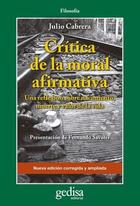The "affirmative" criticized in this book is manifested in the conviction that ethical theory should not ask directly about how-to be (how to live well, how to be happy, etc.), thus answering the most fun-giving question about the value of being itself. In this sense, both Kantian and utilitarian, eudemonist or ascetic ethical theories, regardless of their specific contents, have been, without exception, affirmative. Because of the non-radical nature of his reflection, an immense part of anti-ethical actions that are not strictly based on the transgression of Morais rules, but on their secondary application, on their compliance within restricted areas of action, are systematically outside the critical scope of affirmative ethics. Leibniz, Kant, Schopenhauer, Nietzsche, Heidegger and Wittgenstein are some European philosophers used in this attempt at radical thought. Habermas, Tugendha...read more
Shopping cart
Loading cart
Important notices
|
|
Recordando a André Rouillé: Su legado en la fotografía André Rouillé 1948 - 2025 |
|
|
Libros de filosofía y co. Disponibles en Librería Herder |
|
|
Revista Filosofía & Co. nº 9 Nueva revista de filosofia divulgativa y actualidad |
|
|
"Espacios de la filosofía" - Mauricio Beuchot - Novedad Herder México |
|
|
Revista Filosofía & Co. nº 8 Nueva revista de filosofia divulgativa y actualidad |
Pay safely with:


In the webshop
New
|
|
Fragmento de una historia futura 70143 $340.00 -20.00% $272.00 |
|
|
Bullying 70382 $285.00 -0.00% $285.00 |
|
|
Dislexia 70381 $285.00 -0.00% $285.00 |
|
|
Autismo 70380 $285.00 -0.00% $285.00 |
|
|
Medios calientes 70159 $400.00 -0.00% $400.00 |
In the press
Promotions
|
|
El Gobierno de las emociones 65449 $965.00 -60.00% $386.00 |
|
|
Prosa y poesía. Homenaje a Gonzalo Sobeja 70242 $1,755.00 -25.00% $1,316.25 |
|
|
Lingüística española aplicada a la terapia del lenguaje 70239 $300.00 -25.00% $225.00 |
|
|
Introducción a la filosofía 70243 $620.00 -25.00% $465.00 |
|
|
El tratamiento de los niños autistas 70240 $675.00 -25.00% $506.25 |







